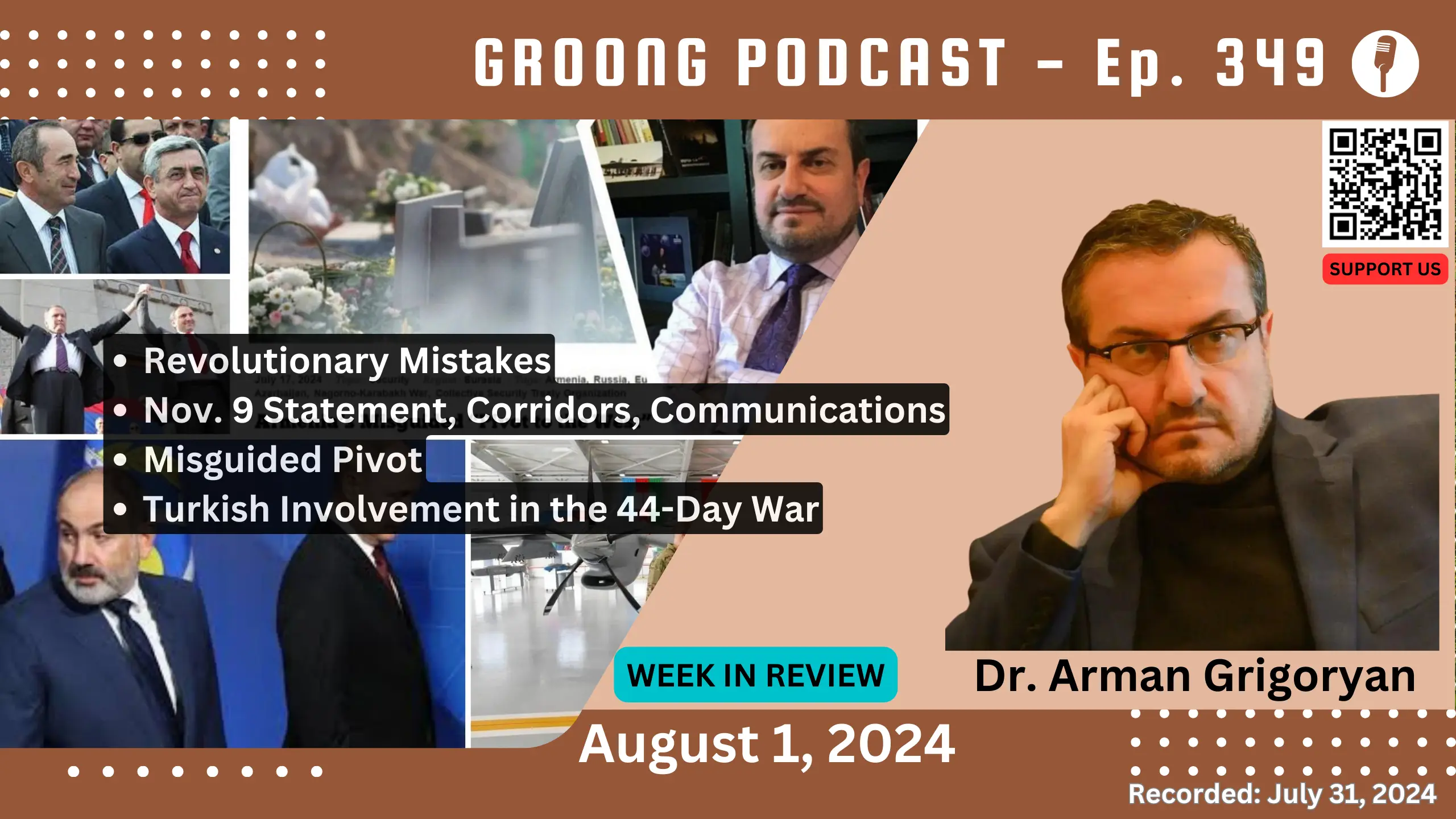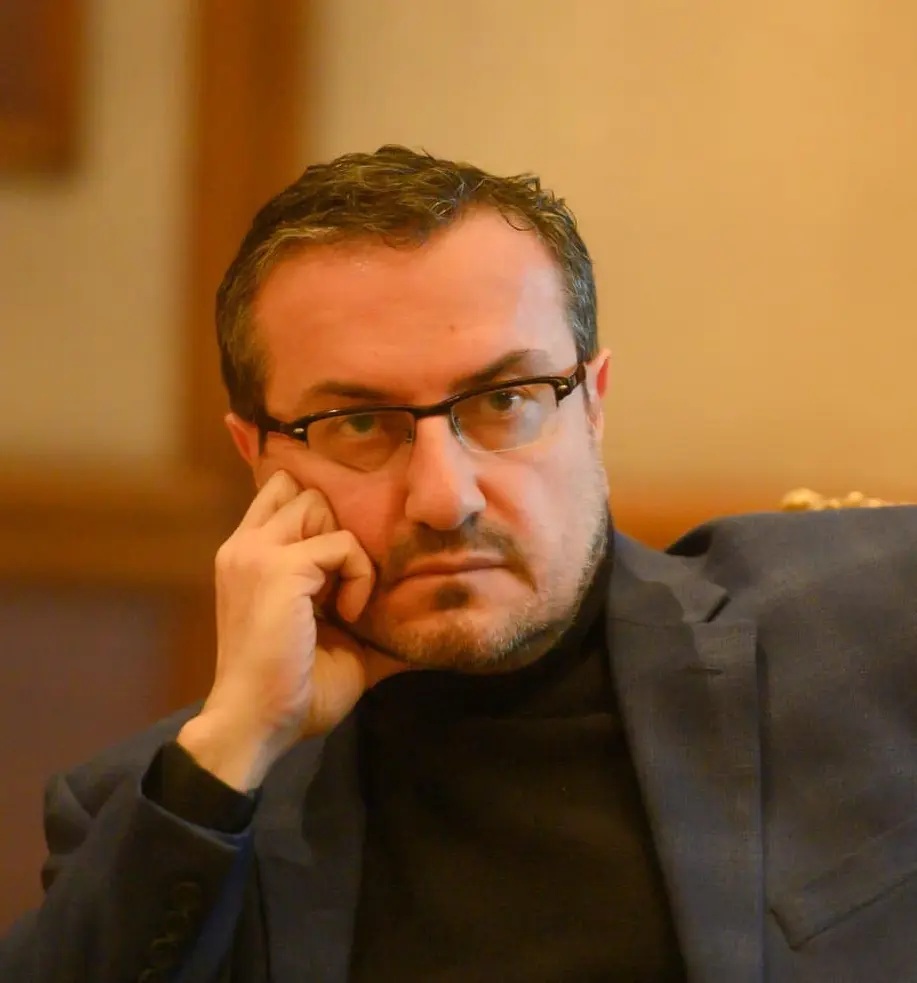
Groong Links:
Guest:
Topics:
- Revolutionary Mistakes
- Nov. 9 Statement, Corridors, Communications
- Misguided Pivot
- Turkish Involvement in the 44-Day War
Episode 349 | Recorded: July 31, 2024
Show Notes
Armenia’s Geopolitical Pivot
A self-introduction of Prof. Arman Grigoryan, of Lehigh University.
Revolutionary Mistakes
In April of this year you published an extensive research paper titled “Revolutionary Governments, Recklessness, and War: The Case of the Second Karabakh War”.
In the early stages of the paper you make the point that as he came to power in 2018, Pashinyan held the position that negotiations were a waste of time if the process was not culminating in a status for Artsakh, maybe in exchange for some of its surrounding territories. So his logic put both Aliyev and the OSCE MG in front of a dead-end situation which would lead the war.
You also make a strong case that Pashinyan was fully aware of the military disadvantage of Armenia, vis-à-vis Azerbaijan, who had outspent it in defense capability 5:1 for the previous decade.
Question:
- Given the case that you make, how does one explain the disastrous path that Pashinyan put Armenia on?
You propose two potential hypotheses to try and explain why the Armenian side behaved recklessly in leading to the defeats of 2020 and since.
- The first is about the intellectual and political ecology in Armenia;
- The second has to do with the nature of revolutionary governments.
Question:
- Can you discuss your points?
Revolutionary? Or Evolutionary?
For decades the argument has been made that Pashinyan is a disciple of first president Levon Ter-Petrosyan, and espoused his principles of mutual compromise.
Questions:
- Do you regard Pashinyan’s 2018 administration as a revolutionary new government, or an evolution of Ter-Petrosyan’s roadmap?
- Do you think the protests of March 2008 were a precursor to 2018?
The Role of “Strategic Myths”
In your paper, you argue that Armenians had developed a set of myths that led them to overestimate their own potential and underestimate the enemy’s potential. Furthermore, this mythology, you argue, created a strong environment that was against compromise.
Questions:
- Was there ever a point in time in history that compromise was possible?
Nov. 9 Statement, Corridors, Communications
When the war was paused on Nov 9 (and we say paused because in reality it was never stopped, in our opinion), Armenians learned that in addition to retreating from huge swaths of Artsakh territory, Armenia also agreed to give Azerbaijan “unimpeded” access to Azerbaijanis traveling to and from Nakhijevan. This is the infamous point #9 of the November 9/10 statement.
All other points have been violated. Not even all of our POWs have been returned.
Yet, Azerbaijan is adamant about demanding an extraterritorial corridor. And in your article you say that the Pashinyan regime decided to drag its feet on implementation of this statement.
Questions:
- Why did this corridor talk come up all of a sudden on November 9? And…
- Why did the Pashinyan team decide to “drag its feet” on the so-called “corridor” given that Pashinyan had expressed similar ideas as far back as 2001?
Misguided Pivot
Your recent article titled Armenia’s Misguided “Pivot to the West” was published in the National Interest. We will link to it in our show notes of course.
Summary of article (using ChatGPT):
- Traditionally, the West treated Armenia as a friendly country but with constraints on how close their relations could be due to Armenia’s strategic value and security needs.
- The West and Russia cooperated on issues like the Karabakh conflict, and there was no active effort to separate Armenia from Russia.
- Attitudes shifted after the Ukraine conflict escalated, leading to high-profile visits from CIA Director, Nancy Pelosi, and British intelligence officials, indicating increased strategic interest in Armenia.
- France and the U.S. have openly supported Armenia, with France providing advanced weaponry and the U.S. promoting Armenia’s exclusion of Russia from regional projects.
- This shift has put Armenia on a collision course with Russia, making it potentially defenseless against Turkey and Azerbaijan and risking severe economic consequences due to dependence on Russia.
- The West’s ability to protect Armenia from Russia is questionable, with limited support and parallels to the experiences of Georgia and Ukraine.
- Armenia’s strategic partnership with the West signals future integration into Western institutions but lacks short-term protection from Russia.
But Was It Really A Pivot?
A pivot implies a recent and abrupt decision. Pashinyan had ideas about switching the geopolitical pole of Armenia as far back as the late 90s and early 2000s. Many of his team members are bona-fide proteges of George Soros.
Question:
- Did Pashinyan’s political orientation flip at a certain point in time, or was his plan to pivot to the West all along?
What Are The West’s Plans?
In your 2020 article you classify the west’s policies around the world as “Selective Wilsonianism”. You note that essentially the west is inciting Armenia to go against Russia without any short term protections. And unlike Ukraine, Armenia not only has one large enemy to deal with, but two, one on the west and the other on the east. Let’s not forget Russia as well, who would not leave the region voluntarily and would consider Armenia’s moves as inimical. Iran would also not be excited about a western ally on its border.
Question:
- What are Western planners thinking about as the big picture? How does Armenia fit in the plans of the west?
Turkish Involvement In The War
One of the reasons for the disastrous outcome of the war for Armenia was Turkey’s involvement. Several days ago, in fact, Erdogan boasted of that involvement, when he threatened Israel with the fate of Karabakh.
We know that Turkey had a significant role in the war in Artsakh. We know that their special forces participated. There were reports that at least one part of the war was being managed and coordinated from an AWACS plane flying over Turkey. Turkey actually had several generals stationed in Azerbaijan.
In fact, without Turkey’s 1000% support of Azerbaijan, it’s hard to imagine if Azerbaijan could have ever gone to war.
Questions:
- Whose vision and instigation was the second war in Artsakh: Erdogan, or Aliyev? And…
- In your assessment, how critical was the Turkish involvement in the 44-day war, for ensuring the defeat of Armenia?
- Could anything have been done by the Pashinyan regime to prevent Turkey’s entry in the war?
Wrap-up
That’s our show, we hope you found it useful. Please find us on Social Media and follow us everywhere you get your Armenian news.
Thanks to Laura Osborn for the music on our podcasts. We’ll talk to you soon!
Guests

Arman Grigoryan
Dr. Arman Grigoryan is an associate professor of International Relations at Lehigh University. He has a doctorate in political science from Columbia University in New York, and a Master in IR from the University of Chicago. His research has appeared in International Security, Security Studies, International Studies Quarterly, International Political Science Review, Nationalities Papers, Ethnopolitics, and International Analytics.
Hosts

Hovik Manucharyan
Hovik Manucharyan is an information security engineer who moved from Seattle to Armenia in 2022. He co-founded the ANN/Groong podcast in 2020 and has been a contributor to Groong News since the late 1990s.
Disclaimer: The views expressed by Hovik Manucharyan on the ANN/Groong podcast are his own and do not necessarily reflect the opinions of his employer or any other organization.

Asbed Bedrossian
Asbed Bedrossian is an IT professional, and for years oversaw the central IT enterprise infrastructure and services at USC. His decades of experience spanned across IT strategy, enterprise architecture, infrastructure, cybersecurity, enterprise applications, data center operations, high performance computing, ITSM, ITPM, and more.
Asbed founded the Armenian News Network Groong circa 1989/1990, and co-founded the ANN/Groong podcast in 2020.